- Home
- Naguib Mahfouz
Children of the Alley Page 26
Children of the Alley Read online
Page 26
Qassem
64
Almost nothing in the alley had changed. Feet that were still bare left their deep prints in the dirt. Flies still lingered in garbage and on people’s eyes. Faces were still tired and haggard, clothes were ragged, obscenities were exchanged like greetings and ears were numb with lies and hypocrisy. The mansion still sat behind its walls, immersed in silence and memory, with the overseer’s house to the right and the protector’s house to the left; then there was Gabal’s neighborhood, and Rifaa’s, in the middle of the alley. The rest of the alley, sprawling down to Gamaliya, was inhabited by uncouth people of uncertain lineage—“Desert Rats,” as they were called—the most lost and miserable people in the alley. Now, at this time the overseer was Sayid Rifaat, and he was like every other overseer. The protector was Lahita, a short, thin man whose appearance did not suggest power, but in a fight his speed, severity and deadliness transformed him into a lick of flame. He had become protector after a series of battles that had made blood flow in every street. The protector of the Al Gabal was called Galta, and his people still prided themselves on being the closest to Gabalawi, as having the best community, and because their man, Gabal, was the first and last to whom Gabalawi had spoken, and the first he had favored. As a result, they were very unpopular. The protector of the Al Rifaa was Hagag, and he had very little resemblance to Ali; he was more like Khunfis and Galta and other usurpers. He embezzled estate revenues, beat anyone who complained and exhorted his people to follow Rifaa’s teaching to despise power and majesty! Even the Desert Rats had their protector, named Sawaris, but he was not trustee to any estate. This was the way life was, and all those who wielded clubs, as well as the poets with their instruments, said that it was a just system that observed Gabalawi’s Ten Conditions, with the overseer and protectors to administrate and supervise it. In the Desert Rats’ territory, old Zachary, the potato seller, was renowned for his goodness, and was distinguished among his people by his distant kinship with Sawaris, the local gangster. He would make the rounds of the alley’s neighborhoods, pushing his cart and hawking potatoes. In the middle of his cart stood the little stove that exhaled the fragrant, delicious smoke that attracted the boys of Rifaa and Gabal as well as boys from Gamaliya, Atuf, al-Darasa, Kafr al-Zaghari and Bait al-Qadi. Zachary had been married for long years without being blessed with a child, but at around this time his loneliness was beguiled by an orphan boy, Qassem—Zachary’s nephew—after his parents died. The man did not find the child a burden, for life, especially in their part of the alley, was nearly as cheap as the lives of the dogs, cats and flies that found their sustenance in dumps and garbage heaps. Zachary loved Qassem as he had loved his father, and when his wife became pregnant after the boy had joined their family, he saw Qassem as a good omen and felt even more tenderly toward him. His love did not diminish when he was blessed with a son of his own, Hassan. Qassem grew up nearly alone, as the day passed with his uncle far from their neighborhood and his aunt busy with her house and baby, but his world broadened as he grew. He played in the courtyard of their building or out in the alley, and made friends with other boys from his own neighborhood, and from Rifaa and Gabal. He went out to the wasteland to play around Hind’s Rock, explored every part of the desert and climbed up the mountain. He and his young friends peered up at the mansion, proud of his grandfather’s prestige, but he was never able to know what to say when some people spoke of Gabal and the others of Rifaa, or what to do when their talk turned gloating or malicious or quarrelsome. How often he gazed at the overseer’s house, puzzled and awestruck; how often he looked longingly and hungrily at the fruit in the trees. One day he saw the gatekeeper nodding off, so he slipped stealthily into the garden without seeing anyone, and without anyone seeing him. He began delightedly walking down the paths, picking guavas from off the lawns and eating them lustily, until he found himself before the pool, where his eyes did not leave the column of water spouting from the fountain. Overwhelmed with delight, he took off his clothes, slipped into the water and began to plunge around, beat his hands on the surface of the water and rub his body with it, oblivious to everything around him. The next thing he knew, a sharp voice shouted angrily, “Othman, you bastard, come here, you blind son of a blind man!” He turned his head toward the source of the sound and saw a man wrapped in a red cloak, standing on the terrace and pointing at him with a trembling finger, his face blazing with rage. He started for the edge of the pool and climbed to the garden bank, leaning on his elbows, and then saw the gatekeeper hurrying toward him. He made for the bower of jasmine adjacent to the wall, forgetting his clothes where he had taken them off. He ran to the gate, rushed into the alley, and Othman chased him, catching up with him in the middle of the neighborhood. He snatched him by the arm and stopped, panting, and Qassem’s bellows rose until they filled the alley. In no time his aunt came, carrying her baby, and Sawaris came out of the coffeehouse. His aunt was taken aback at his appearance, and took him by the hand.
“For shame,” she told the gatekeeper, “you’ve terrified the boy. What has he done and where are his clothes?”
“His excellency the overseer saw him swimming in the fountain!” shouted the gatekeeper haughtily. “The little devil should be flogged. The rascal got in while I was sleeping. Why don’t you give us a rest from your little devils!”
“We are sorry. The boy is an orphan. You are right,” said the woman urgently, taking him from the man’s hand. “I’ll punish him for you, but please, sir, can’t we have his only clothes back?”
The gatekeeper made an exasperated gesture and turned his back on her as he started home.
“Thanks to this vermin I have been cursed and insulted—dirty little devils! This stinking alley!”
The woman went back to the building holding Hassan on her hip, hauling Qassem by the hand as he gulped and cried.
65
Zachary gazed at Qassem with satisfaction.
“You are not a child anymore, Qassem. You are almost ten,” he said. “The time has come for you to start working.”
Qassem’s dark eyes shone with delight. “How often I’ve hoped you’d take me with you, uncle!”
“You wanted to play, not work,” the man laughed. “But today you are a bright boy and you can help me.”
The lad ran to the handcart, trying to push it, but Zachary prevented him.
“Be careful the potatoes don’t fall out, or we’ll starve to death,” said his uncle’s wife.
Zachary caught the cart handles in his hands.
“Walk in front of the cart and call out, ‘Fabulous potatoes, roasted potatoes,’ and watch everything I say and do. You’ll be taking potatoes up to customers who live upstairs. Just keep your eyes open in general.”
“But I can push it,” said Qassem, gazing regretfully at the cart.
The man pushed the cart and said, “Do as I told you and don’t be stubborn. Your father was a fine man.”
The cart descended toward Gamaliya, with Qassem shouting in a voice as high as a whistle, “Fabulous potatoes, roasted potatoes!” Nothing could touch his delight as he set out into strange neighborhoods and worked like a man. When the cart reached Watawit Alley, Qassem looked around him and told his uncle, “This is where Idris blocked Adham’s path!”
Zachary nodded disinterestedly.
“Adham was pushing a cart, just like you!” Qassem continued, laughing.
The cart made its daily rounds, from al-Hussein to Bait al-Qadi, and from Bait al-Qadi to al-Darasa, while Qassem stared with astonishment at the pedestrians, the shops and the mosques, until they came to a small square his uncle told him was Muqattam Marketplace. The boy contemplated it admiringly.
“Is this really Muqattam Marketplace? This is where Gabal fled; this is where Rifaa was born!”
“Yes,” said Zachary without enthusiasm. “Neither one of them is ours!”
“But we are all children of Gabalawi,” said Qassem. “Why aren’t we like them?”
Za
chary laughed. “At least we’re poor like them!”
The man steered his cart toward the fringes of the marketplace on the edge of the desert, directly toward a sheet-metal hut which seemed to be a shop selling worry beads, incense and amulets. An old man with a long white beard sat on a hide out in front of it. Zachary stopped the cart at the hut and warmly shook hands with the old man.
“I have all the potatoes I need today,” the man said.
“To me, sitting with you is better than making money,” said Zachary as he sat down beside him.
The old man looked at the boy curiously. “Come here, Qassem, and kiss Yahya’s hand.”
The boy approached the old man, took his skinny hand and kissed it politely. Yahya ruffled Qassem’s thick hair and considered his handsome face.
“Who is the boy, Zachary?”
“The son of my late brother,” said Zachary, stretching his legs out in the sun.
He had the boy sit beside him on the hide, and asked him, “Do you remember your father, boy?”
“No, sir,” said Qassem, shaking his head.
“Your father was a friend of mine, and he was a fine man.”
Qassem raised his eyes to the merchandise, gazing at the colors. Yahya reached over to a nearby shelf and selected an amulet, then hung it around the boy’s neck.
“Keep it, and it will keep you from all harm.”
“Yahya was from our alley,” said Zachary. “From the Rifaa neighborhood.”
Qassem looked at Yahya. “Why did you leave our alley, sir?”
“The Rifaa gangster got mad at him a long time ago and he decided to leave,” Zachary said.
“You did the same thing Shafi’i, Rifaa’s father, did!” said Qassem in surprise.
Yahya laughed a long, toothless laugh and said, “You knew that, my boy? How well the people of our alley know the stories—what’s wrong with their heads, that they never learn?”
The coffeehouse boy came with a tea tray, which he set down in front of Yahya, and left. Yahya drew a small package from the breast of his clothes and began to unwrap it.
“I have something valuable here,” he said contentedly. “Its effects will last until morning!”
“Let’s try it,” said Zachary, sounding interested.
“I’ve never heard you say no,” laughed Yahya.
“How can I refuse pleasure?”
They divided the piece and began to chew it. Qassem watched them, fascinated, until his uncle laughed. The old man began to sip his tea. “Do you dream of becoming a gangster, like the people of our alley?” he asked Qassem.
“Yes,” said Qassem, smiling.
Zachary cackled, then added apologetically, “Forgive him, Yahya. You know that in our alley either a man is a gangster or he offers them his head to smack.”
“God rest your soul, Rifaa,” sighed Yahya. “How did our infernal alley produce you!”
“It was his end, as you know.”
“Rifaa did not die on the day of his death.” Yahya frowned. “He died the day his successor turned into a gangster!”
“Where is he buried?” Qassem asked with concern. “His people say that our ancestor buried him in his garden. The Al Gabal say that his body was lost in the desert.”
“The damned villains!” shouted Yahya angrily. “They still feel hatred for him, even today!” More composed, he asked, “Tell me, Qassem, do you love Rifaa?”
The boy looked cautiously over at his uncle but said simply, “Yes, sir, I love him very much.”
“Which would you love more, being like him or being a gangster?”
Qassem turned to him two eyes which showed both perplexity and amusement. He moved his lips to speak but said nothing.
“Let him be content to sell potatoes, like me,” laughed Zachary.
Silence fell among them as the marketplace went into an uproar over a donkey which had flung itself to the ground, overturning the cart it was fastened to; the lady passengers hopped out of it, while the driver rained blows on the donkey.
“We have a long journey,” said Zachary, getting up. “Peace, Yahya.”
“Bring the boy with you whenever you visit,” said Yahya. He shook Qassem’s hand and ruffled his hair. “You’re remarkable.”
66
The only place in the desert that offered shelter from the raging sun was Hind’s Rock. That is where Qassem sat on the ground with no companions but the sheep. He wore a clean blue galabiya—as clean as a shepherd’s galabiya can be—with a thick turban to shield his head from the sun, and old, frayed leather slippers on his feet. He was lost in his thoughts part of the time, and the rest of the time watched the ewes, rams, nanny goats and kids. His staff lay at his side. Muqattam loomed near, looking huge and gloomy from where he sat, as if he were the sole creature under the limpid dome, challenging the wrath of the sun, pained but unyielding. The desert rolled on to the horizon, burdened with heavy silence and burning air. When he had worn out his thoughts, dreams and youthful, evanescent suppositions, his gaze roamed to the flock, taking in their play and sport, their fights and their romances, their movement and their idleness, especially the kids and baby lambs, who excited his love and sentimentality. He marveled at their black eyes; their stares made his heart beat faster, as if they were speaking to him. He spoke to them in turn, and compared the affectionate care he gave them with the insults the people of the alley got from the arrogant gangsters. He paid no attention to the condescending view of shepherds in the alley, convinced from the very start that a shepherd was better than a bully, a phony or a beggar. Anyway, he loved the desert and the pure air, and enjoyed the companionship of the Muqattam, Hind’s Rock and the dome of the sky with its strange moods—and shepherding always brought him to Yahya. The first time Yahya saw him as a shepherd, he asked, “From a potato seller to a shepherd?”
“Why not, sir?” asked Qassem, not embarrassed. “It’s a job that hundreds of idle men in my neighborhood begrudge me!”
“Why did your uncle let you go?”
“My cousin Hassan got bigger, and he has more right to go with Uncle on his rounds than I do. And tending sheep is better than begging!”
Not a day passed without him visiting his teacher. He loved him, and was enthralled by his conversation; he had found in him a man immersed in the lore of his alley, its present and its past. He knew everything the poets sang of and more, and even knew what was often deliberately ignored. “I tend sheep from every neighborhood,” Qassem told Yahya. “I have sheep from Gabal, and some from Rifaa, and from the rich people in our own neighborhood. And the marvel is that they all graze together in brotherhood, something unknown among their bigoted owners in our alley!” He also told him that “Humam was a shepherd. And who are the people that despise shepherds? Beggars and slobs, and the unemployed. At the same time, they respect the gangsters, and what are the gangsters but shameless, bloodthirsty thieves. God forgive the children of the alley!”
Once, he told him jokingly, “I’m poor and happy. I don’t lift my hand to hurt anyone, and even my sheep get only affection from me. So, am I not like Rifaa?”
“Rifaa! You, like Rifaa!” The man stared at him in horror. “Rifaa spent his life saving his brothers from demons, so that they could be good!” Then the old man laughed. “You are a boy crazy about women, you lurk in the dark for the desert women!”
“Is there something wrong with that, sir?”
“It’s your own business, but don’t say you’re like Rifaa!”
Qassem considered this a moment, then said, “Wasn’t Gabal like Rifaa, one of the good children of Gabalawi? He was, sir, and he fell in love and married, and he gained his people’s rights in the estate, and distributed them justly.”
“But his only goal was the estate!” said Yahya sharply.
The boy thought this over and then said plainly, “But civility, justice and the law were other goals of his.”
“So you think Gabal is better than Rifaa?” asked Yahya indignantly.
&n
bsp; His dark eyes filled with confusion, and Qassem hesitated for a long time before saying, “They were both good men, and how rare good people are in our alley. Adham, Humam, Gabal and Rifaa—that’s it. But gangsters—we have so many!”
“And Adham died heartsick, Humam was murdered and Rifaa was murdered!” said Yahya sadly.
Those were indeed the good men the alley had produced. Brilliant lives and bad ends, Qassem whispered to himself as he sat in the shadow of the great rock. A burning desire to be like them rose in his heart. The gangsters—how degraded their deeds were. A mysterious sadness entered him, and unease gripped him. He said to himself, to allay his fear: How many people, how many deeds, this rock has witnessed—the passion of Qadri and Hind, the murder of Humam, the meeting of Gabal and Gabalawi, Rifaa’s talk with his ancestor. But where were the deeds and where were the people? Only fond memories, but they were more precious than a flock of goats and sheep! And this rock witnesses our great ancestor when he roams these horizons all alone, doing his own will, as wrongdoers are terrified. So how is he, in his isolation?
At the end of the day he got up, stretched and yawned. He whistled melodiously and waved his staff. The sheep bleated and began to gather and troop off in a mass toward town. He felt hungry; he had eaten nothing all day long but a small fish and a small loaf of bread, but a good dinner awaited him at his uncle’s house. He quickened his pace until he caught the first glimpse from afar of the mansion and its high walls, its shuttered windows and the tops of the trees. What was the garden like, the garden that the poets sang of, for which Adham had died pining? As he drew closer to the alley, its chaotic noise reached his ears. He passed opposite the great wall into the alley as the air filled with darkness. He made his way between mobs of frolicking boys flinging mud at one another, his ears assaulted by peddlers’ cries, women’s gossip, the sarcasm and obscenities of the idle, the shrieks of lunatics, and the bells on the overseer’s vehicle, while his nose was filled with the strong smell of tobacco laced with honey, rancid garbage and the lovely aroma of garlic and coriander sauce. He ascended to the buildings of Gabal to bring its sheep home and did the same in Rifaa, and then had only one ewe left, belonging to Lady Qamar, the only lady who owned property in the Desert Rats’ neighborhood. She lived in a two-story house with a medium-size courtyard; a palm tree grew in the center, and a guava tree in the corner. He walked into the courtyard driving Naama in front of him, meeting the slave woman, Sakina, with her frizzy, graying hair on his way. He greeted her, and she greeted him back with a smile. “How is Naama?” she asked in her coppery voice.

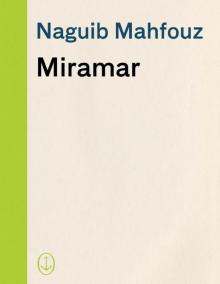 Miramar
Miramar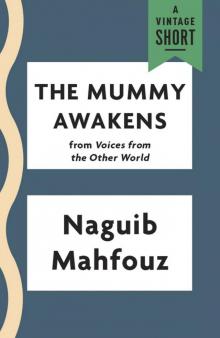 The Mummy Awakens
The Mummy Awakens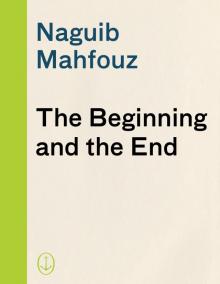 The Beginning and the End
The Beginning and the End Respected Sir, Wedding Song, the Search
Respected Sir, Wedding Song, the Search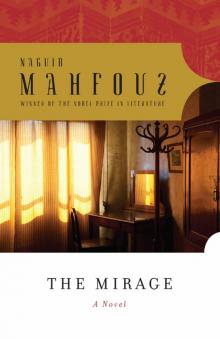 The Mirage
The Mirage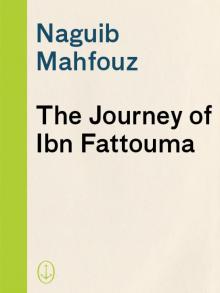 Novels by Naguib Mahfouz
Novels by Naguib Mahfouz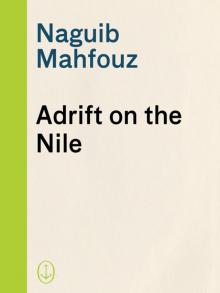 Adrift on the Nile
Adrift on the Nile Karnak Café
Karnak Café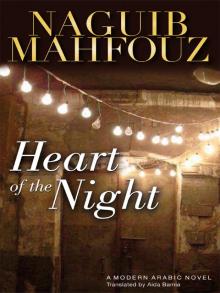 Heart of the Night
Heart of the Night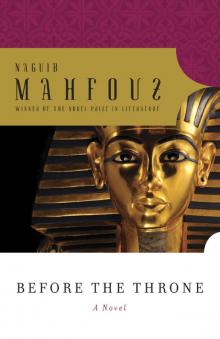 Before the Throne
Before the Throne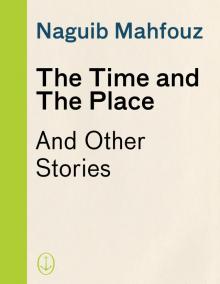 The Time and the Place: And Other Stories
The Time and the Place: And Other Stories Cairo Modern
Cairo Modern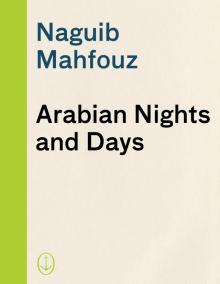 Arabian Nights and Days
Arabian Nights and Days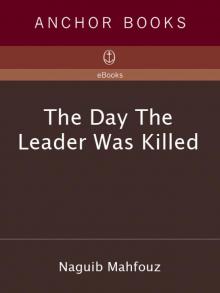 The Day the Leader Was Killed
The Day the Leader Was Killed Morning and Evening Talk
Morning and Evening Talk Three Novels of Ancient Egypt Khufu's Wisdom
Three Novels of Ancient Egypt Khufu's Wisdom Akhenaten: Dweller in Truth
Akhenaten: Dweller in Truth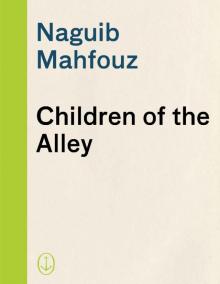 Children of the Alley
Children of the Alley Voices From the Other World
Voices From the Other World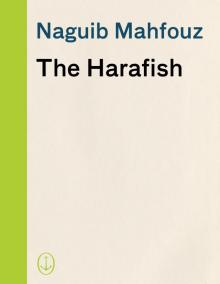 The Harafish
The Harafish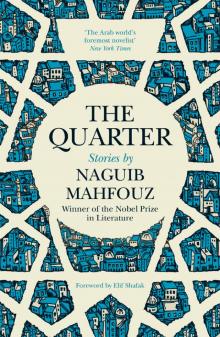 The Quarter
The Quarter The Seventh Heaven: Supernatural Tales
The Seventh Heaven: Supernatural Tales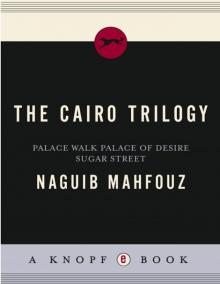 The Cairo Trilogy: Palace Walk, Palace of Desire, Sugar Street
The Cairo Trilogy: Palace Walk, Palace of Desire, Sugar Street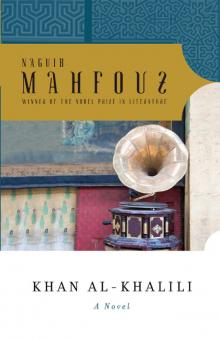 Khan Al-Khalili
Khan Al-Khalili Three Novels of Ancient Egypt Khufu's Wisdom, Rhadopis of Nubia, Thebes at War
Three Novels of Ancient Egypt Khufu's Wisdom, Rhadopis of Nubia, Thebes at War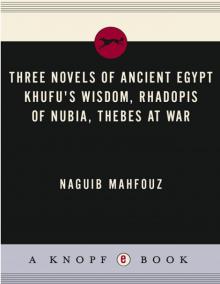 Three Novels of Ancient Egypt
Three Novels of Ancient Egypt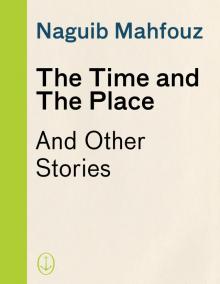 The Time and the Place
The Time and the Place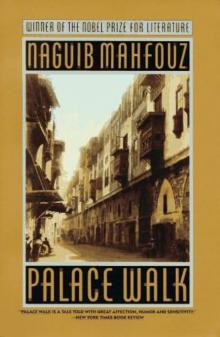 Palace Walk tct-1
Palace Walk tct-1 Akhenaten
Akhenaten The Seventh Heaven
The Seventh Heaven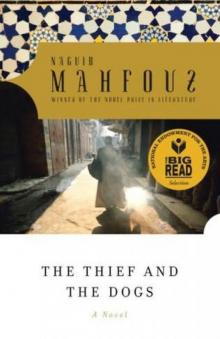 The Thief and the Dogs
The Thief and the Dogs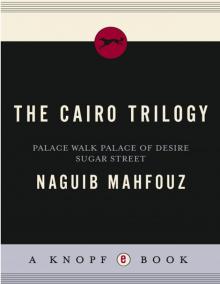 The Cairo Trilogy
The Cairo Trilogy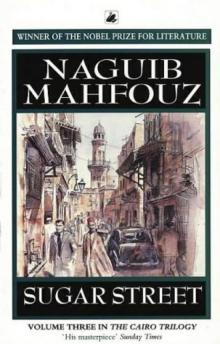 Sugar Street tct-3
Sugar Street tct-3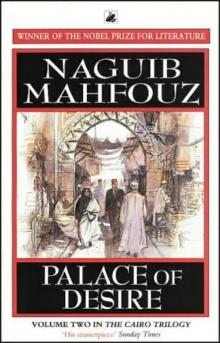 Palace of Desire tct-2
Palace of Desire tct-2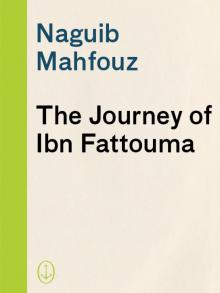 The Journey of Ibn Fattouma
The Journey of Ibn Fattouma